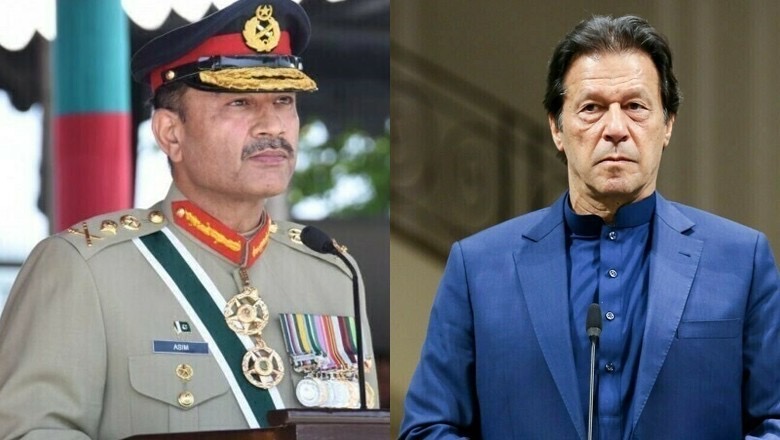Imran Khan’s Open Letter: Has He Given Up, Struck a Backchannel Deal, or Devised a New Political Strategy? Why Are His Workers Disillusioned?
Analysis by Raja Zahid Akhtar Khanzada
The letter written by Pakistan Tehreek-e-Insaf (PTI) founder and former Prime Minister Imran Khan to Army Chief General Asim Munir has sparked a new debate. Government circles have dismissed it as a “storm in a teacup,” while PTI sees it as a means to clarify its stance.
This letter comes at a time when Imran Khan is facing serious legal troubles, and his party is grappling with political and legal challenges. His lawyers argue that the letter is not only an attempt to improve relations with the military but also a positive step toward political stability. However, the government believes that Imran Khan has exhausted all his options and is now desperate for any form of support, whether from the United States or the Pakistani establishment.
Critics of Imran Khan argue that his decision to write to the Army Chief is proof that he is retreating from his hardline stance and has realized his mistakes. Some analysts suggest that his direct address to the military indicates a shift from confrontation to reconciliation. In the letter, Imran Khan highlighted six key points, including alleged rigging in the February 8 elections, the 26th constitutional amendment affecting judicial independence, media restrictions, cases against PTI, political instability, and economic decline. Considering these points, some analysts believe that Imran Khan is now adopting a more flexible policy to regain political relevance.
Within PTI, there is a sense of disappointment, particularly because their hopes pinned on Donald Trump’s victory have not materialized. Imran Khan and PTI expected that Trump’s return to power would garner them international support, especially in the name of human rights and democracy. However, so far, neither Trump nor his team has offered any clear support, issued an executive order, or even tweeted in favor of Imran Khan.
A particularly interesting development is that Trump’s close associate and business partner, Jerry Bapich, has announced investments in Pakistan, signaling a move in a different direction than what PTI had hoped for. Jerry Bapich is not only a close ally of Trump Jr. but also a business partner and an influential figure in American corporate circles.
Adding to the intrigue, Khyber Pakhtunkhwa Chief Minister Ali Amin Gandapur recently made a startling revelation, suggesting that something was indeed negotiated behind the scenes. He warned, “Whoever backs out now will break their word.”
In this context, Gandapur’s statement has stirred further controversy. He disclosed that Imran Khan was offered relocation to Nathia Gali, Bani Gala, or the Chief Minister’s House to facilitate negotiations. According to him, “At one point, 80% of the matters were settled, and at another, 99% were resolved, but Imran Khan first insisted on the release of his workers.” This statement sheds light on the internal struggles within PTI—while the party workers are pressuring against any deal, the leadership is seeking a way forward through negotiations.
Ali Amin Gandapur’s statement, “Whoever backs out now will break their word,” suggests that PTI has reached a critical juncture where any misstep could lead to further divisions within the party.
Currently, PTI is under immense political, legal, and financial pressure. Many of its leaders are either in jail or facing court cases, while the party itself is entangled in various legal battles. In this situation, the decision to write to the Army Chief could be a strategic move to mend ties with the establishment. Critics argue that Imran Khan is politically isolated and is now making desperate efforts to regain his footing. On the other hand, PTI leaders maintain that the letter is an attempt at national reconciliation and not an act of submission.
Recently, a video surfaced online featuring a conversation between Imran Khan’s sister, Aleema Khan, and a PTI worker. In the video, the worker passionately states, “Zulfikar Ali Bhutto was also a leader who chose the gallows over a deal.” This statement reflects not only the emotions of PTI supporters but also recalls a significant chapter in Pakistan’s political history.
Zulfikar Ali Bhutto, Pakistan’s first elected Prime Minister, was executed in 1979. He was charged with murder, but his supporters and many historians believe it was political revenge. Bhutto was reportedly given several opportunities to seek clemency, but he refused, declaring, “History will never forgive me if I bow down.”
This same sentiment is now visible among PTI workers. The reference to Bhutto in Aleema Khan’s video underscores the belief that a true leader never compromises on their principles.
After Imran Khan’s letter to the Army Chief, the unrest within PTI indicates that the party workers strongly oppose any potential deal. In their view, if their leader is facing difficulties, he should confront them with resilience, just as Bhutto did.
The question remains: Is Imran Khan ready to follow the same path, or will circumstances lead him in a different direction? History has shown that Pakistani politics is often a battle between ideological commitment and political pragmatism.
Imran Khan’s letter can be interpreted from multiple perspectives. On one hand, it signals a shift in his political stance, suggesting a willingness to pursue reconciliation. On the other hand, it could merely be a strategic move to reclaim political ground. Whatever the reality, one thing is clear—PTI is currently navigating a highly uncertain political landscape, where every option must be considered for survival.
If the military takes the letter seriously and responds positively, it could be a major breakthrough for Imran Khan. However, if the letter is ignored, as seems likely, it will indicate that PTI may face even greater challenges ahead.




